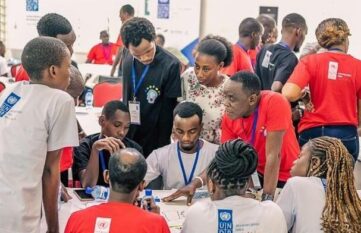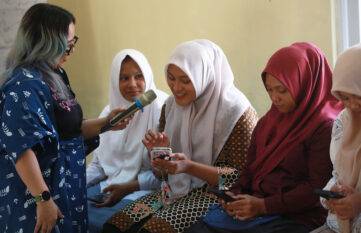How open data and crowdsourcing are changing development cooperation
Whether flood damage, illegal logging or even human rights violations – all these scenarios can be detected and monitored remotely. Digital data from drones, satellites or cameras combined with the collective intelligence of mobile phone users and artificial intelligence (AI) enable remote management, monitoring and verification (RMMV) of development cooperation (DC) projects as never before. At a conference organised by KfW and BMZ at the beginning of February 2023, around 800 participants from 80 countries from Brazil to South Sudan discussed the topic online, presented a large number of best practice solutions and developed recommendations for the future.

“We can only achieve the UN development goals if we use the new technologies,” warned Robert Opp, Chief Digital Officer (CDO) of UNDP. Whether it is deforestation rates, the biodiversity of a region or the extent of damage after a natural disaster, satellite images and drone footage help to assess these. Open data from publicly accessible sources is becoming increasingly important, as a survey among the conference participants also showed. How well data contributes to finding solutions, however, still depends on people: “Digital transformation is not a technological process, but a cultural change,” emphasised Khalid El Attar, Vice Minister of Automation, Digital Transformation and Administrative Development in Egypt. Transparency and the trust of the local civilian population form the basis for apps and platforms to be accepted.
Increase the participation of citizens
Simplicity is the key to making citizen participation work. The applications are as diverse as the topics of DC. In Madagascar, for example, local citizens upload data to Open Street Map to document the distribution of water points, toilets and roads in informal settlements and thus improve planning. The app SAFETIPIN enables women to inform each other about safety in public spaces. The aggregated data sets can be used by governments and DC organizations for planning in order to make urban infrastructure safer. The app SENSEMAKER enables the structured collection of the experiences of many individuals to more precisely identify needs for help. The inventor of this app and founder of Cynefin, Prof. Dave Snowden, postulated the ethical obligation to put people at the centre when using digital technologies and called for a paradigm shift in DC – away from monitoring towards data assessment by the people affected and a distributed decision-making.

Opportunities for supply chain traceability
“The development banks come into play when it comes to applying the tools on a larger scale. Funding is needed for this,” explained Dr. Thomas Baldauf, who is driving the implementation of the new EU regulation for deforestation-free products and supply chains at the German Federal Ministry of Food and Agriculture (BMEL) and is also focusing on digital applications. So far, supply chains for soy, palm oil or coffee, for instance, have often been non-transparent. Initiatives such as the German-Rwandan Kaffeekoop GmbH therefore use tools that allow all stakeholders in the coffee value chain to access the data.
What’s next?
RMMV instruments were originally developed to manage projects in conflict regions. Born out of the crisis, RMMV, however, is no longer a niche topic. In the two years since the previous conference, the use of RMMV in DC has become widespread, as the large number of solutions presented showed. KfW Development Bank, which now has a network of RMMV pilots, has therefore published a comprehensive guidebook in 2022 that presents common instruments and their possibilities. To facilitate access to innovative solutions, information on RMMV tool and service providers will also be summarized in a booklet shortly and made available on the conference website.

For the further development of the recommendations of the conference and the future personal exchange on RMMV and the digital transformation in DC, the [digital.global] network provides the appropriate platform.



